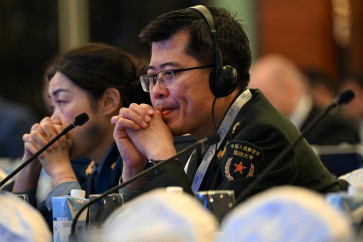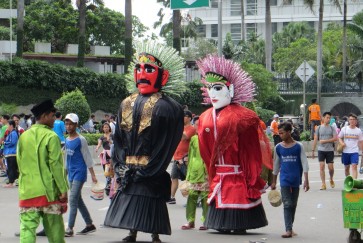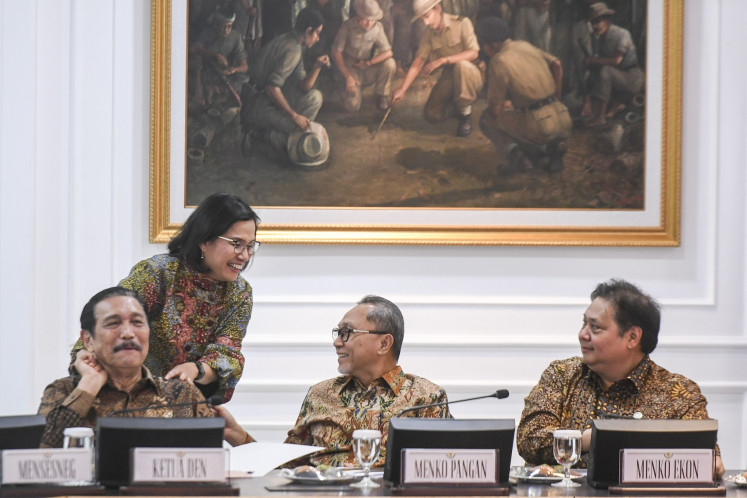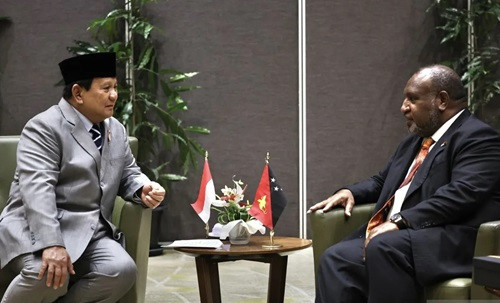Treasuring childhood with traditional games
marble soccer: Children play marble soccer
Change text size
Gift Premium Articles
to Anyone
 marble soccer: Children play marble soccer. (JP/Sylvia Lim)" border="0" height="341" width="512">marble soccer: Children play marble soccer. (JP/Sylvia Lim)
marble soccer: Children play marble soccer. (JP/Sylvia Lim)" border="0" height="341" width="512">marble soccer: Children play marble soccer. (JP/Sylvia Lim)A meaningful life philosophy often lies in childhood play.
It is what Endi Aras, a leader of a traditional games community called Komunitas Permainan Tradisional, believes in.
When children play, they develop their imaginations to move beyond the bounds of reality â an orangeâs skin can be a fishermanâs boat, a stem of a banana leaf can be a sword and a little kid can be a superhero.
Growing up in the Central Java town Salatiga, Endi recalled that he really loved to play with a catapult, a slingshot made from twigs and a rubber band.
âI usually recycled the metal parts of broken shoes as bullets. Sometimes I used rubber seeds. This is how traditional games work. You just use the materials from nature. No need to spend money,â says tEndi, who studied child psychology at the Satya Wacana University.
After finishing his formal education, Endi worked as a correspondence for media in Jakarta as well as being an event organizer for many art and cultural festivals. His turning point came with a spinning top festival â Festival Gasing â held at Ragunan Zoo in 2005.
 Edi Kushandi shows an audience how to spin a top. (JP/Sylvia Lim)
Edi Kushandi shows an audience how to spin a top. (JP/Sylvia Lim)
âSince then, I developed a new hobby, collecting traditional spinning tops. Then I set up Gudang Dolanan Indonesia to store them,â says Endi.
From that time, every weekend, children from his neighborhood come to play in his houseâs front yard and he provides them with toys.
âI want to give an alternative to our children who have been raised in a âgadgetâ era. Unlike digital games, where they mostly sit in front of the computer, traditional games give them more freedom and creativity to express their imaginations,â says the 50-year-old man, who has introduced traditional games to his only son, Rintang Pandu Abiyoga.
Before the invention of video games and the proliferation of social networking sites, most children spent their spare time playing traditional games, from hide-and-seek, egrang (bamboo stilts) to hopscotch.
These days, many children spend less time physically playing together, glued to computers or engaged in interactive multimedia entertainment.
Endi, supported by singer Renny Djayusman and his two friends â Gilang and Kresnowati, built a traditional games community in 2007.
Gilang serves as field coordinator in training the children to play the games while Kresnowati is responsible for the Cimantra Movement â short for âCintai Permainan Tradisionalâ (Love our traditional games) campaign.
 Students play on egrang (bamboo stilts) at school. (JP/Nurhayati)
Students play on egrang (bamboo stilts) at school. (JP/Nurhayati)
The campaign then developed into a real project â Kampung Dolanan Nusantara, a center where children can play traditional games. Kresnowati is the marketing and promotion event planner, while Renny Djayusman in charge of fundraising.
They now have two locations â the first one is in Sodongan village, Magelang, near the Borobudur temple in Central Java; and another one in Urug rest area in Tasikmalaya, West Java. The places set free admission and the customers only need to rent toys for a small price, from Rp 3000 to Rp 5000. The income is used for helping local people.
âOur focus is in providing social services, not business. If the project can help people make a living, then itâs thanks to God,â says Kresnowati, the mother of two children.
They are currently planning to open another one in the Prambanan temple.
The most popular traditional games are gasing (the spinning top) and congklak, the popular shell game.
For Gilang, one of the traditional game trainers in the spinning top game, the top itself has a special meaning.
âIn the games, the top should be balanced to ensure it keeps spinning. It reflects our ancestor lifeâs philosophy that we have to balance our priority to live a long life,â Gilang says.
 Egrang batok, which uses coconut shells. (JP/Sylvia Lim)
Egrang batok, which uses coconut shells. (JP/Sylvia Lim)
Spinning top trainer Edi Kushandi of the Sanggar Eka Warga group in Taman Mini area, says there are three levels in the spinning top game â bawah or basic level, tinjak or middle level and selintot, the advance level.
âOn the basic level, we wrap the rope to the spinning top then we squat down and release it quickly to make it spin. On tinjak level, we throw the top from higher angle. The most advance is the selintot level, where we kind of slam down the spinning top,â Edi explained.
âThe shorter the top is, the harder it is played.â
The community also works together with parents and teachers to promote traditional games.
Nur Ida Aida, an art teacher from SMP 281 Kramat Jati junior high, said that since the school joined the traditional games competition in Taman Mini Indonesia Indah park recently, their students have fallen in love with the games.
âWe now play the games during class meeting and also during sport lessons. I think these games are really good for students. They help their emotional intelligence. They can learn about honesty, teamwork, strategy, creativity and innovation,â Ida says.
âI like to play egrang batok. I love to hear the sound when I walk on that. Itâs really exciting,â says Danisa, a ninth grader who came with her friends, Vania and Laksmi, to a recent exhibition on traditional games held at the National Gallery in Jakarta.
âI donât like digital games. They hurt my eyes. I prefer traditional games because they are more educative.â
These three students did not worry people would consider them âold-fashionedâ when playing the traditional games.
âItâs exciting anyway. Our friends also love it. Whenever people see us playing the games, they will always want to join,â Danisa says
marble soccer: Children play marble soccer. (JP/Sylvia Lim) A meaningful life philosophy often lies in childhood play. Gilang serves as field coordinator in training the children to play the games while Kresnowati is responsible for the Cimantra Movement ' short for 'Cintai Permainan Tradisional' (Love our traditional games) campaign. For Gilang, one of the traditional game trainers in the spinning top game, the top itself has a special meaning. Spinning top trainer Edi Kushandi of the Sanggar Eka Warga group in Taman Mini area, says there are three levels in the spinning top game ' bawah or basic level, tinjak or middle level and selintot, the advance level. 'I don't like digital games. They hurt my eyes. I prefer traditional games because they are more educative.' 
It is what Endi Aras, a leader of a traditional games community called Komunitas Permainan Tradisional, believes in.
When children play, they develop their imaginations to move beyond the bounds of reality ' an orange's skin can be a fisherman's boat, a stem of a banana leaf can be a sword and a little kid can be a superhero.
Growing up in the Central Java town Salatiga, Endi recalled that he really loved to play with a catapult, a slingshot made from twigs and a rubber band.
'I usually recycled the metal parts of broken shoes as bullets. Sometimes I used rubber seeds. This is how traditional games work. You just use the materials from nature. No need to spend money,' says tEndi, who studied child psychology at the Satya Wacana University.
After finishing his formal education, Endi worked as a correspondence for media in Jakarta as well as being an event organizer for many art and cultural festivals. His turning point came with a spinning top festival ' Festival Gasing ' held at Ragunan Zoo in 2005. 
'Since then, I developed a new hobby, collecting traditional spinning tops. Then I set up Gudang Dolanan Indonesia to store them,' says Endi.
From that time, every weekend, children from his neighborhood come to play in his house's front yard and he provides them with toys.
'I want to give an alternative to our children who have been raised in a 'gadget' era. Unlike digital games, where they mostly sit in front of the computer, traditional games give them more freedom and creativity to express their imaginations,' says the 50-year-old man, who has introduced traditional games to his only son, Rintang Pandu Abiyoga.
Before the invention of video games and the proliferation of social networking sites, most children spent their spare time playing traditional games, from hide-and-seek, egrang (bamboo stilts) to hopscotch.
These days, many children spend less time physically playing together, glued to computers or engaged in interactive multimedia entertainment.
Endi, supported by singer Renny Djayusman and his two friends ' Gilang and Kresnowati, built a traditional games community in 2007. 
The campaign then developed into a real project ' Kampung Dolanan Nusantara, a center where children can play traditional games. Kresnowati is the marketing and promotion event planner, while Renny Djayusman in charge of fundraising.
They now have two locations ' the first one is in Sodongan village, Magelang, near the Borobudur temple in Central Java; and another one in Urug rest area in Tasikmalaya, West Java. The places set free admission and the customers only need to rent toys for a small price, from Rp 3000 to Rp 5000. The income is used for helping local people.
'Our focus is in providing social services, not business. If the project can help people make a living, then it's thanks to God,' says Kresnowati, the mother of two children.
They are currently planning to open another one in the Prambanan temple.
The most popular traditional games are gasing (the spinning top) and congklak, the popular shell game.
'In the games, the top should be balanced to ensure it keeps spinning. It reflects our ancestor life's philosophy that we have to balance our priority to live a long life,' Gilang says. 
'On the basic level, we wrap the rope to the spinning top then we squat down and release it quickly to make it spin. On tinjak level, we throw the top from higher angle. The most advance is the selintot level, where we kind of slam down the spinning top,' Edi explained.
'The shorter the top is, the harder it is played.'
The community also works together with parents and teachers to promote traditional games.
Nur Ida Aida, an art teacher from SMP 281 Kramat Jati junior high, said that since the school joined the traditional games competition in Taman Mini Indonesia Indah park recently, their students have fallen in love with the games.
'We now play the games during class meeting and also during sport lessons. I think these games are really good for students. They help their emotional intelligence. They can learn about honesty, teamwork, strategy, creativity and innovation,' Ida says.
'I like to play egrang batok. I love to hear the sound when I walk on that. It's really exciting,' says Danisa, a ninth grader who came with her friends, Vania and Laksmi, to a recent exhibition on traditional games held at the National Gallery in Jakarta.
These three students did not worry people would consider them 'old-fashioned' when playing the traditional games.
'It's exciting anyway. Our friends also love it. Whenever people see us playing the games, they will always want to join,' Danisa says 
Veteran singer Renny Djayusman herself has been fascinated with congklak. 'This is my childhood game,' she said while playing it with her grandson, Ryu.
Popular among young Javanese girls, many experts believed congklak is the oldest board game in the world.
According to Steward Culin, the director of Archeology and Paleontology at the University of Pennsylvania, the game's origin was from Syrian. It was known to have a different name, Mancala which means 'to transfer' in Arabic ' exactly what the players do: moving pieces from one to another.
'Introducing traditional games to our children is really important. Once they love their toys, they will learn to love their country. So this is my investment for the next generations.' Renny said of her involvement in the community.
Through their work, Kampung Dolanan Nusantara community has a dream to provide traditional games center in every town of Indonesia.
'We want to present traditional games in a professional way. We want to make them popular and modern like Universal Studios,' Renny said. 'We dare to dream, because we believe there is a future for our traditional games.'
Your Opinion Matters
Share your experiences, suggestions, and any issues you've encountered on The Jakarta Post. We're here to listen.
Thank You
Thank you for sharing your thoughts. We appreciate your feedback.
Share options
Quickly share this news with your network—keep everyone informed with just a single click!
Gift Premium Articles
to Anyone
Share the best of The Jakarta Post with friends, family, or colleagues. As a subscriber, you can gift 3 to 5 articles each month that anyone can read—no subscription needed!
Continue in the app
Get the best experience—faster access, exclusive features, and a seamless way to stay updated.









